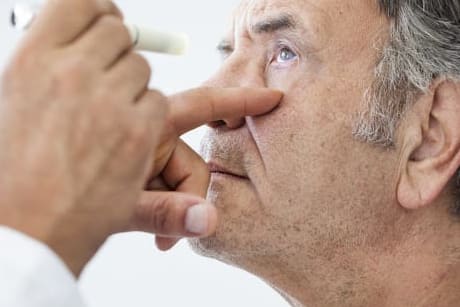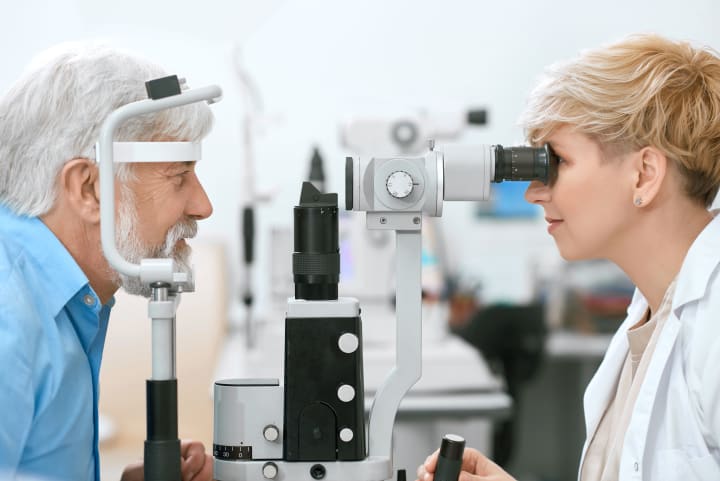Aging Eyes: 9 Ways to Keep Your Eyes Healthy as You Age
As we age, the sharpness of our vision gradually declines. Age-related eye problems can affect your quality of life, lead to loss of independence and increase the risk of falls and injuries. Today, approximately 20 percent of Americans aged 60 and older are experiencing visual impairment. Fortunately, there are several steps you can take to protect your aging eyes and preserve your eyesight.
The month of May is Healthy Vision Month. This is a perfect time to think about the importance of eye health. You can also learn about the various eye diseases that occur with age and how to prevent them. This information will go a long way in helping you keep your eyes healthy as you age.

Here's what you need to know.
Common Eye Diseases and Impairments That Occur With Age
The age-related eye issues that you are likely to develop as you grow older are of a wide variety. Recognizing the early signs of the diseases and impairments will enable you to seek timely and proper treatment. They include:
Age-Related Macular Degeneration (AMD)
This eye disease affects central vision, causing vision to change over time. The problem occurs when the macular, the part of the retina that controls straight-ahead and sharp vision, gets damaged due to aging. Seniors with AMD may experience mild blurriness, distorted vision, and trouble seeing in low lighting. As such, you may have a difficult time reading, driving, and performing other daily activities.
Diabetic Retinopathy
This eye disorder may occur in older adults with diabetes. It affects blood vessels in the retina, leading to poor vision. Most people do not notice any symptoms during the early stages of the disease. However, as it progresses, you may develop blurry vision, poor night vision, fluctuating vision, or spots at the center of your vision.
Cataracts
Cataracts are a common eye condition that occurs when a dense, cloudy patch develops in the normally clear lens of the eye. This prevents light from entering the eye, effectively leading to vision changes. Symptoms of cataracts include clouded or blurred vision, reduced night vision, light sensitivity, double vision, and changes in how you see color.
Glaucoma
This happens when fluid buildup in the eye leads to increased pressure in the eye. This may in turn damage the optic nerve, leading to a decrease in visual function. If left untreated, this eye condition can cause vision loss and blindness. Signs of the disorder include eye pain, low vision, blurred vision, red eyes, and seeing halos around lights.
Dry Eye
Dry eye is a condition that occurs when the tear glands are not working properly. This affects their ability to produce adequate natural tears to lubricate the eyes. People with dry eyes may experience a burning sensation in the eyes, eye redness, light sensitivity, blurry vision, or watery eyes. The condition is more common in older adults.

9 Tips for Maintaining Healthy Vision Against Aging Eyes
Taking care of your aging eyes will enable you to maintain an active lifestyle. Below are some best practices to combat age-related eye problems and strengthen eyesight.
1. Eat a Healthy Diet
Eating a nutrient-rich diet will help prevent eye conditions like cataracts and age-related macular degeneration. To boost your eye health, make sure you fill your plate with foods that are rich in antioxidants, zinc, vitamin C, vitamin E, and omega-3 fatty acids. Eye-healthy foods to incorporate into your diet include vegetables, fruits, fish, nuts, and eggs.
2. Keep Your Eyes Protected From the Sun
The sun is one of the best sources of vitamin D for our bodies. However, direct sunlight can damage your eyes. Extended exposure to UV radiation may increase the risk of developing macular degeneration, cataracts, and eye cancer. To keep your aging eyes healthy and maintain your vision, remember to wear sunglasses whenever you are outdoors.
3. Wear Your Prescription Glasses
Your prescription glasses or contacts play an important role in promoting eye health. Apart from correcting your existing vision problems, the eyewear will help to improve your vision and reduce eye strain. As such, you should always wear your prescription eyewear to combat and prevent further vision problems. It is also important to ensure that your glasses or contacts prescription is up to date.
4. Get Regular Eye Exams
After the age of 65, consider scheduling an eye examination every year. Regular eye checkups present an opportunity for your ophthalmologist to check whether your eyes are healthy and your vision is good. If you have eye problems, the professional will determine whether you can see better with contacts or glasses. In addition, the eye specialist will check for signs of eye disease and administer proper treatment before they develop into more serious issues.
5. Ensure There Is Ample Light Indoors
Too much light can damage your eyes while insufficient light can cause eyestrain and eye fatigue. If you want to keep your aging eyes healthy, make sure your rooms are well-lit. This is particularly important if you do tasks such as reading, working on your computer, or watching TV a lot.
6. Reduce Screen Time
Reducing the strain on your eyes will help to improve both eye health and vision. In addition to adjusting your screen settings, you should reduce the amount of time you spend looking at your phone, computer, or TV screen. When using the devices, consider giving your eyes a 20-second break after every 20 minutes. This will give your eyes time to relax.
7. Exercise Regularly
Staying physically active helps you to maintain healthy body weight, something that reduces the risk of diabetic retinopathy. Regular physical activity also improves blood circulation. This ensures that your eyes are properly nourished. For seniors, taking part in low-impact exercises like walking, jogging, swimming, and yoga will help to maintain good vision.
Similarly, eye exercises such as blinking, rolling your eyes, shifting your gaze to a target, and holding your focus for several seconds will help to strengthen eyesight.
8. Avoid Smoking
Cigarette smoke contains toxins that can irritate and harm the eyes. Indeed, tobacco smoke can contribute to eye problems such as uveitis, age-related macular degeneration, and cataracts. To protect the health of your eyes, quit smoking if you smoke.
9. Get Enough Sleep
As an older adult, make sure you get enough sleep every night. Getting sufficient sleep will ensure your eyes get the rest they need, are free from strain, and are renewed. In the end, maintaining a healthy sleep pattern will help you keep your eyes healthy as you age and avoid long-term eye issues.

This list is by no means exhaustive. There is a lot more you can do to keep your aging eyes in tip-top shape. Be sure to stay hydrated, avoid rubbing your eyes, and manage chronic conditions such as diabetes, heart disease, and high blood pressure.
Vision problems can affect multiple aspects of your life. For older adults, this can be a slippery slope. At Integrated Senior Lifestyles retirement communities, we are committed to providing quality care, enriching your life, and delivering a high-quality retirement experience. Contact us today to learn more.


